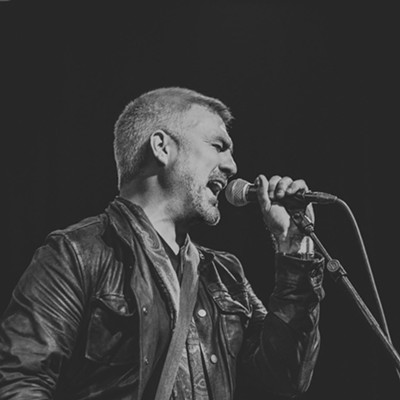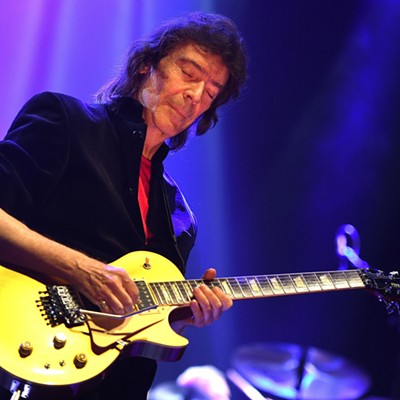A glowing bit of international press is the last thing Insley expected when the band--a collective of Phoenix roots music veterans--first got together in 1999 as a side project for members of the Nitpickers and Grave Danger. Led by Insley and Arizona psychobilly avatar Kevin Daly, the group has quickly earned a heap of critical kudos and a growing legion of fans for its first effort, Dark and Bloody Ground, released on Insley's own Rustic Records imprint. Tagging it "country noir" and offering a favorable comparison to Calexico, Mojo is just the latest to praise the band's moody desert muse.
And although the Husbands are clearly more of a rowdy roadhouse combo than serious "indie rock" artistes, it's easy to understand the Brits' fascination with the darker aspects of the group's debut. The bulk of the Husbands' disc is a loosely knit conceptual piece tied together by the crimson-hued artwork of Bob Boze Bell (which graces the cover and insert) and a clutch of tracks that take their inspiration from the late 19th-century range war that erupted in Arizona's Tonto Basin. The balance of the songs traipses the kind of musical territory--rockabilly car tunes and twangy truckin' anthems--that should invite the interest of the hot-rod and pompadour set.
The cars, guns and outlaw opus opens, ironically enough, with an unapologetic pop ditty called "Everybody Knows." Though it seems a bit incongruous given the context, Daly's charging, tongue-in-cheek love song kicks off the proceedings nicely. The track (as well as "She Don't Love You") showcases Daly's deceptively skilled sense of songcraft, an aspect of his work that has often been obscured by his notorious reputation as an onstage wildman.
The lightheartedness of the opener is quickly abandoned for the ominous narrative of the title track. The Spanish guitar motif and fiddle that thread through the song reinforce the foreboding wordplay ("They shouldn't have grazed there / Wasn't his land / É Won't the sun ever go down on this dark and bloody ground?") that mines the lore of the notorious Pleasant Valley War. The 1880s conflict took the lives of at least 20 men over a five-year period and branded the souls of the area's inhabitants for generations.
"We've always been into that aspect of Western folklore," notes Insley. "The album grew, thematically we realized that was going to be kind of a touchstone. And it's something we came back to throughout making the record." The historical or saga song, once a rich vein of American songwriting--finding its heyday in the late '50s and early '60s work of Marty Robbins, Johnny Horton and Johnny Cash--long ago fell into the category of the lost art form. Dark and Bloody Ground--while also making way for other stylistic concerns--authoritatively recaptures the spirit and tenor of genre watersheds like Cash's Ballads of the True West and Robbins' underrated The Drifter.
"It was completely unconscious in a way," says Insley of the band's almost accidental quasi-concept album. "I don't think anybody had it in their mind to plan it the way it came out. But growing up in my house, Marty Robbins records and things like that were in constant rotation, so it can't help but mold you in that sense."
The disc's historical theme continues with "Willie," a dying gunfighter's apologia for a life spent on the business end of a Colt. Cast against the warm, languid guitar is a stream of lyrical imagery that pulls a thematic abstraction from the John Wayne cinematic swan song The Shootist ("So now I must be leaving / All the things time will destroy / É But I'm disappearing so fast into the void").
Before things turn too serious, we get Daly's revved-up reading of his own "Cadillac"--a live-show favorite--and a song with just enough clever phrase turns ("I spend enough cash on that Cadillac to build a new one out of parts / Every time I fix that son of a Pontiac, well, she's broken down again") to push it out of the realm of novelty and into blissful world of the three-chord romp.
Midway through the disc, it becomes apparent that the Trophy Husbands' aim is essentially to split the difference between the players' main bands, effectively merging the back-porch country of the Nitpickers and the over-the-top psychobilly anthemics of Grave Danger.
The track that illustrates that synthesis best is the truck-drivin' braggadocio of Ray King's "Big Wheel." Insley's big, grinning baritone finds both the cockiness and outlandish comedy in the lyrics: "Every truckstop I go in they turn the jukebox low / 'Cause I'm the one who calls the tunes wherever I go / And while the girls fight over who's gonna bring me my meal / I sit back and drink my coffee black, Big Wheel."
Elsewhere, on "Just Call Me Lonesome," Insley's beaten-dog croon ("I wander a-l-ooone") turns various shades of wistful, hurt and melancholy before returning to the chorus and some bolstering harmonies from the rest of the Husbands' crew.
Whether flashing various emotional colors or paying homage to their musical ancestry, Insley and Daly have a rare appreciation for and command of the nuances of country phrasing and storytelling. They're the kind of guys who've obviously spent endless hours studying every inflection found on the long-players of Jimmy Martin and Joe Maphis, and have put that informal education to good use.
Musically, the bulk of the dozen songs stays within the confines of a laid-back country groove. The rhythm of drummer Tom Post and bassist Jeff Farias (who also provides the "Ghost Riders in the Sky" vocal gloom of "Cowboy Justice") go about their business quietly, never intruding on the proceedings.
Producer Jeff Farias' tasteful production solidifies the sound with deft touches of choral harmonies, meaty top-string twang and familiar shuffle beats, elements that help make meaningful sonic connections to the records and artists that inspired the Husbands' muse in the first place. Among the cast of players who guest on the album are Nitpicker comrades Jeff Borick and Jim Bolek, pedal-steel star Jon Rauhouse (sideman for the Old 97s, Waco Brothers, etc.) and guitar guru Doug Williams, as well as Rustic labelmate Tammy Patrick, whose ghostly trills counterpoint the lament of Insley's "Skellys 1975."
Despite the help, the record is primarily a me-and-the-boys effort, with little to distract from the chemistry of the four-man core. While the group's cheeky moniker suggests that the whole affair might have been conceived day drunk on a Sunday, it's executed with the level of wit and precision that few similarly intentioned recordings can claim.
Along with alt-country combos like Truckers on Speed, Chicken and Heather Rae and the Moonshine Boys, the Husbands' success over the past two years has helped spearhead a resurgent wave of roots music in Phoenix. Buoyed by the out-of-the-box success of Rustic Records--which serves as a home to the Nitpickers and Grave Danger, as well as SoCal honky tonker Mark Insely and Indiana's Crooked County--Dave Insley seems genuinely gratified by the response the group's effort has generated.
"Well, the whole thing has been really unexpected," he says. "Obviously, we've worked really hard to get the label off the ground. But with the Husbands we've got something like 160 radio stations playing the record, which is as successful as anything I've ever been involved with.
"And this [band] really started almost by accident," he adds, chuckling. "It just goes to show you that sometimes you don't need to try so hard for things to work out really well."
The Trophy Husbands perform Saturday, February 10 at Che's Lounge with Heather Rae and the Moonshine Boys. Show time is 9 p.m. Admission is free.







